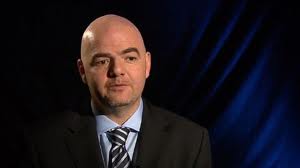By Andrew Warshaw, chief correspondent
March 15 – Third party ownership, the process by which professional footballers’ ‘rights’ and careers are controlled by outside parties, is one of the most serious issues facing the European game, according to UEFA, and could be banned from all its competitions.
Infantino first publicly expressed UEFA’s get-tough policy in December and writing in the March edition of the UEFA Direct publication, he warned that third party ownership – prevalent in south America – had no place in the game and raised a serious number of ethical and moral conflict of interest questions.
“Is it appropriate for a ‘third party’ to own the ‘economic rights’ in another human being and then to ‘trade’ this ‘asset’?” Infantino writes. “This would be unacceptable in society and has no place in football. Players should (like everyone else) have the right to determine their own future.
“We must protect the integrity of sporting competition. What happens when the same corporation or fund owns the ‘economic rights’ in many players in different teams? There is an obvious risk of conflicts of interest. The danger of manipulation of results is something that UEFA must guard against, now more than ever.”
The more a player part-owned by outside interests moves club, Infantino cautioned, the more cash goes into the pockets of those who are not directly involved in the game. “Put bluntly, more transfers means more money for such “owners”, resulting in contractual instability and long-term revenue being lost from the sport.”
In addition, he writes, third-party ownership flies in the face of the principles of Financial Fair Play. “Clubs should not rely on investments from ‘third parties’ to acquire players that they cannot afford in the first place. In the long term, this is not good for the club or the player. Quick-fix, short-term solutions conflict with the rules and principles of FFP.”
Summing up, Infantino says that third party ownership should be prohibited as a matter of principle and that UEFA, in conjunction with its own PFSC (Professional Football Strategy Council), is willing to act unilaterally if FIFA doesn’t impose a blanket ban.
“Such a prohibition already exists in some European countries, and it is time to introduce it across the board. Since third-party player ownership appears to be a global phenomenon, and given that FIFA is responsible for the operation of the international player transfer system, we have asked the world body to take the necessary steps to introduce a global prohibition. Unless the necessary steps are taken, UEFA will, together with the PFSC, be ready to implement appropriate rules to phase out this activity in our competitions.”
“We understand that an adjustment period may be needed, and UEFA would be in favour of transitional measures. Nevertheless, we are firmly of the view that third-party player ownership has no place in football, and our priority remains to protect football, and to build and maintain the long-term stability of our sport.”
Contact the writer of this story at moc.l1744644653labto1744644653ofdlr1744644653owedi1744644653sni@w1744644653ahsra1744644653w.wer1744644653dna1744644653

